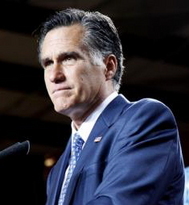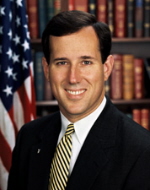Will Mitt Romney Win the Battle for the Middle Class?
The former Massachusetts governor has discussed middle class Americans in debates more than all other candidates combined

The sporadic GOP frontrunner caught flack from the left for seeming uncaring about the poor as well as criticism from the right for utilizing the kind of class warfare tactics with which Democrats and President Obama purportedly engage.
But the focus of Romney’s economic plan on the middle class – to the exclusion of the lower class and wealthy – has been a repeated talking point during his campaign and in the debates in particular.
A Smart Politics review of the 19 Republican presidential debates finds that Mitt Romney has made more references about the need to address the problems of the middle class (41) than the remainder of the GOP field combined (31).
Romney has averaged 2.3 references per debate in which he has celebrated or advocated policies to assist middle-income Americans and the middle class.
His 41 such references are more than four times that of the next closest candidate.
Aside from Tim Pawlenty, who made a handful of references to his “working class” background during the three debates in which he participated, the three candidates with the highest rate of advocating for the middle class per debate are three of the four candidates still left in the race: Romney, Rick Santorum, and Ron Paul.
Romney has brought attention to the problems faced by the middle class, and how his economic plan can address these problems, throughout the debates this cycle – raising the issue at least once in 11 of the 18 debates in which he has participated.
Some selections:
“We have got to help the middle class in this country.” (New Hampshire #2)
“We can be the best place in the world to be in the middle class again, with jobs plentiful for our kids and for each one of us that are looking for those jobs today.” (California)
“And immediately, let’s get some relief for middle-income Americans.” (New Hampshire #3)
“And so my plan is to take the middle class individuals and dramatically reduce their taxes by the following measure. And that is for middle income Americans, no tax on interest, dividends or capital gains. Let people save their money as the way they think is best for them, for their kids, for their future, for their retirement. We’re taxing too much, we’re spending too much and middle income Americans need a break and I’ll give it to them.” (Florida #1)
“I’m in this race to try to get America to make sure we’re strong again and we’re creating jobs where the best place in the world to be middle class again.” (New Hampshire #2)
“Well, the reason for giving a tax break to middle income Americans is that middle income Americans have been the people who have been most hurt by the Obama economy. The reason that you’re seeing protests, as you indicated, on Wall Street and across the country is, middle income Americans are having a hard time making ends meet.” (New Hampshire #2)
“I want to reduce taxes on middle income families. I like your chutzpah on this, Herman, but I have to tell you, the analysis I did, person by person, return by return, is that middle income people see higher taxes under your plan. If it’s lower for the middle class, that’s great. But that’s not what I saw.” (Nevada)
“Who can make sure that it’s good to be middle class in America again?” (Iowa #2)
“But right now, the question is not the people at the — that are not paying taxes at the low end. The question is not the people who are very, very rich. The question is, how about middle-income Americans? Who are the people most hurt by the Obama economy? And the answer is the middle class. The great majority of Americans are having a very, very difficult time. And our effort has to be to find ways to reduce to burden on those people. The middle class needs our help.” (California)
During one six-debate stretch – from the California gathering at the Ronald Reagan Library in early September to the Michigan debate in late October – Romney raised the middle class issue 28 times.
And, eventually, Romney drew fire for these remarks.
The scolding Romney has taken in recent days from conservative critics as well as candidates on the campaign trail for his purported “class warfare” rhetoric came weeks after he was first admonished by Rick Santorum at the third New Hampshire debate in Manchester on January 7th:
“And the governor used a term earlier that — that I shrink from. And — and it’s one that I don’t think we should be using as Republicans, middle class. There are no classes in America. We are a country that don’t allow for titles. We don’t put people in classes. There may be middle income people, but the idea that somehow or another we’re going to buy into the class warfare arguments of Barack Obama is something that should not be part of the Republican lexicon. That’s their job, divide, separate, put one group against another.That’s not the — that’s not the language that I’ll use as president. I’ll use the language of bringing people together.”

However, the former Pennsylvania U.S. Senator codes his speech with different phrases, and instead couches his appeals to help the middle class with rhetoric such as “middle income,” “people in the middle,” and the “middle of America”:
“And I believe that’s because we’ve lost our manufacturing base. No more stamp “Made in America” is really hurting people in the middle.” (Nevada)
“We want to encourage people to set up jobs here in America. Take that R&D credit, make it permanent, take that innovation and then invest that money here to create that broad middle of America and have that wealth really trickle down.” (New Hampshire #1)
“I grew up in a steel town. And one of the things that I realized is that, when manufacturing left, a lot of the people in the middle income of America left. And what we – I just read a recent study that actually income mobility from the bottom two quintiles up into the – up into the middle income is actually greater, the mobility in Europe than it is in America today. We need to change that. And the way you do it is by – by creating jobs in the manufacturing sector of the economy, which is what I will do. It will create that income mobility.” (New Hampshire #2)
“When I grew up in Butler, Pennsylvania, a little steel town, 21 percent of the people of this country worked in manufacturing. It is now nine. If you want to know where the middle of America went, it went to China, it went to Malaysia, it went to Indonesia. We need to bring it back.” (Iowa #1)
“We cut the corporate tax from 35 percent to zero, because we want to build the great middle of America again, get those jobs that were shipped overseas by companies that were looking too make a profit because they couldn’t any longer do it here, and bring those jobs back to America.” (California)
“What the American people want is a policy that’s going to get people the opportunity to rise in society, to fill that great middle of America, and that is manufacturing jobs.” (Florida #1)
Interestingly, Santorum hasn’t made a reference to middle income Americans since the Nevada debate in mid-October, other than to chastise Romney as quoted above.

“So who – who got into trouble? The people who did the speculating, the Wall Street, the derivatives market? They got the bailout. So what happened to the middle class? They lost their jobs. They lost their houses.” (New Hampshire #2)
“But who got stuck? The middle class got stuck. They got stuck. They lost their jobs, and they lost their houses.” (Nevada)
“But middle class is suffering, but not only because we bale out the rich and dump on the poor and they lose their jobs and they lose their houses, but there’s a characteristic about monetary policy. When a country destroys its currency, it transfers wealth from the middle class to the wealthy, and this is what you’re seeing today: the elimination of the middle class.” (Iowa #2)
“But instead of liquidating debt, what we’ve done is the people who built up the debt on Wall Street and the banks, we’ve had the American taxpayer bail them out. We — we bought it through the Federal Reserve and through the Treasury, dumped it on the American people. The middle class is now shrinking. And we don’t have jobs.” (New Hampshire #3)
“Because there’s a characteristic about what happens when you destroy a currency. There is a transfer of wealth from the middle class to the wealthy. And this has been going on for 40 years. So the middle class is shrinking. They are getting poorer and they’re losing their jobs and they’re losing their houses. But Wall Street isn’t getting poorer. And they are the ones who are getting the bailout.” (Florida #4)
Overall, the 10 Republican candidates who have participated in the 19 debates have tallied 72 references to the middle class, or 3.8 per debate.
Only Herman Cain and Gary Johnson refrained from making such a reference.
References to the Middle Class and Middle Income Americans During the 2012 GOP Debates by Candidate
|
Candidate
|
# Mentions
|
Per debate
|
|
Mitt Romney
|
41
|
2.3
|
|
Rick Santorum
|
10
|
0.5
|
|
Ron Paul
|
8
|
0.4
|
|
Newt Gingrich
|
4
|
0.2
|
|
Tim Pawlenty
|
3
|
1.0
|
|
Jon Huntsman
|
3
|
0.3
|
|
Michele Bachmann
|
2
|
0.2
|
|
Rick Perry
|
1
|
0.1
|
|
Herman Cain
|
0
|
0.0
|
|
Gary Johnson
|
0
|
0.0
|
|
Total
|
72
|
3.8
|
Includes references to the middle class, middle-income, and working class Americans. Data compiled by Smart Politics.
Follow Smart Politics on Twitter.
